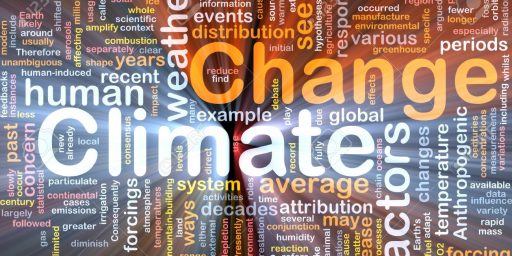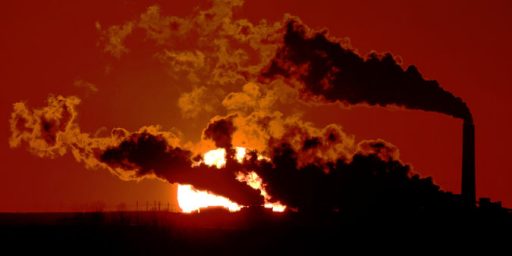Guardian Drops Neutrality in Climate Crisis Reporting
Gone are 'climate change' and 'skeptic.' In are 'global heating' and 'denier.'

The Guardian has issued major changes to its style guide in regards to reporting on global warming:
The Guardian has updated its style guide to introduce terms that more accurately describe the environmental crises facing the world.
Instead of “climate change” the preferred terms are “climate emergency, crisis or breakdown” and “global heating” is favoured over “global warming”, although the original terms are not banned.
“We want to ensure that we are being scientifically precise, while also communicating clearly with readers on this very important issue,” said the editor-in-chief, Katharine Viner. “The phrase ‘climate change’, for example, sounds rather passive and gentle when what scientists are talking about is a catastrophe for humanity.”
“Increasingly, climate scientists and organisations from the UN to the Met Office are changing their terminology, and using stronger language to describe the situation we’re in,” she said.
The United Nations secretary general, António Guterres, talked of the “climate crisis” in September, adding: “We face a direct existential threat.” The climate scientist Prof Hans Joachim Schellnhuber, a former adviser to Angela Merkel, the EU and the pope, also uses “climate crisis”.
In December, Prof Richard Betts, who leads the Met Office’s climate research, said “global heating” was a more accurate term than “global warming” to describe the changes taking place to the world’s climate. In the political world, UK MPs recently endorsed the Labour party’s declaration of a “climate emergency”.
The scale of the climate and wildlife crises has been laid bare by two landmark reports from the world’s scientists. In October, they said carbon emissions must halve by 2030 to avoid even greater risks of drought, floods, extreme heat and poverty for hundreds of millions of people. In May, global scientists said human society was in jeopardy from the accelerating annihilation of wildlife and destruction of the ecosystems that support all life on Earth.Other terms that have been updated, including the use of “wildlife” rather than “biodiversity”, “fish populations” instead of “fish stocks” and “climate science denier” rather than “climate sceptic”. In September, the BBC accepted it gets coverage of climate change “wrong too often” and told staff: “You do not need a ‘denier’ to balance the debate.”
—-The Guardian, “Why the Guardian is changing the language it uses about the environment“
My initial instinct here is that the Guardian is abandoning journalistic objectivity, using the most extreme language suggested—in some cases, quite recently—by propagandists on the one side of the debate and thus putting its thumb on the scales. Indeed, it’s engaging in activism rather than reporting.
But, in reality, what the editors are doing is acknowledging that there is no debate.
There are simply no credible scientists who believe that average temperatures aren’t rising, that humans aren’t a major contributing factor, or that the impact on human life of continuing down the current course aren’t severe if not catastrophic. Treating people who disagree with the overwhelming consensus as equals in a debate is a disservice to readers whose duty it’s theirs to inform.
There’s still a debate about what to do about the problem. Reasonable people can differ as to whether global treaties that treat the United States and the European Union differently than China are good policy. Ditto whether any particular regulation designed to lower emissions produces enough benefit to justify the costs. But it’s long past time to pretend that there is no problem.





But The Guardian has always had a political bias, as have the other British papers, certainly to a far greater extent than we see here in the United States generally speaking. In that context, this isn’t surprising.
It would be bigger news if The New York Times or Washington Post were to do this, I think.
They are asserting journalistic integrity. Treating the blatant lies of one side as holding equal weight as the overwhelming scientific facts of the other is just cowardly ‘both siderism’ bullshit.
From the New York Times:
As the oceans rise the seal populations will decline……..
Oh, did I mention, that was from the NYTs………… in 1922.
More recently, the NYTs did a big story on the shrinking of the largest glacier in the world. Funny thing, though; its now increasing in size. No NYTs story. Imagine that.
Settled science………snicker
Global Warming deniers use similar tactics to the creationists, such as Gish Galloping BS claim after BS claim faster than they can be refuted.
so here’s a handy list of the main hundred and ninety-seven bullshit claims they make, with explanations of why they’re wrong.
(At root this is a very simple thing. Chemists have known since the 1800s that CO2 traps heat. Industrial society since the revolution 150 years ago has been powered by burning carbon and creating carbon dioxide. Something like 38 billion tons last year. As the carbon dioxide concentration goes up, the temperature has been going up. The details get complicated but the basic phenomenon is so simple scientists have been discussing it for literally a hundred years now.)
@Guarneri: Loves you some filthy pollution, don’t you, little man, just like your self-described “filthy” riches.
What a waste of skin you are.
The Guardian isn’t giving up objectivity. They’re giving up the lazy bothsides pretense of objectivity all too common in the supposedly liberal MSM.
@Teve: They’re often the same people, going back to the tobacco wars where the older ones learned the trade.
@gVOR08: Exxon scientists and executives discussed what to do about global warming in the late 1970s and early 80s. The brass realized that there were enough suckers that a few million dollars in propaganda would buy enough confusion to let them continue selling carbon indefinitely. Unfortunately, they were right, there are enough suckers.
Fortunately the political will is finally changing. One significant thing that could happen would be to remove the massive subsidies that fossil fuels get, which would make renewables even more attractive.
fossil fuels are underpriced by 5 trillion
@Guarneri: So how bad does the situation have to get before you admit there’s a problem?
….and how do you plan to fix it, given that we don’t have another planet to get to?
…or are you just going to shrug your shoulders and say “not my problem!”
Except there is more to it than that. Yes, your first two points (temps are rising and humans are a major factor) aren’t disputed. But future effects are much less certain than climate activists believe and there are other things to consider. We still don’t know, for example, how sensitive the climate system is to CO2 – a fundamental factor that drives everything else, especially future effects, how quickly they will manifest, and how bad they will be. Pointing that out will get you labeled a “denier.”
The “consensus” in the media has actually been defined by a relatively small number of activist scientists and is different from the actual consensus of the climate science community. Therefore, I think that journalists with integrity should focus on what the actual science says, not what advocates claim it says. That means they should run any claims by the IPCC which is THE consensus when it comes to climate science.
But we are at a point where pointing out consensus scientific statements by the IPCC will get you labeled a “denier” when those statements don’t agree with the narrative. And journalism has done a very poor job of explaining the actual consensus, especially the wide range of future possible outcomes.
The IPCC is writing their next set of reports now (The sixth Assessment Reports), but unfortunately it’s a slow bureaucratic process and won’t be finished for two-three years.
So Freeman Dyson, Judith Curry are not “credible” scientists?
This is actually a good flip. So was the over the top Bill Nye flaming expletive earth video. Although it would be amusing if he’d had a CO2 extinguisher on the table. As it is, dry chem extinguishers use CO2 or Nitrogen as their propellent. Irony.
But the crisis of climate heating can only be solved by aggressive implementation of nuclear power. Nuclear power is the future if you hope to reduce the use of fossil fuels and not have a large portion of the population suffer and die.
Of course, the other way is global tyrannical government imposing its will in the manner of Stalinist USSR. What’s the carbon footprint of machine-gunning deniers as well as believers who aren’t devoted enough? Will the ovens at the camps run on wind or solar power? What is the contribution to the global heating from the poison gas or will it be recovered for reuse on the next batch of inmates?
@JKB:
As usual, you’re ill-informed, dishonest and ludicrous. No one who has spent any mental effort at all on this thinks nuclear power is the only solution. It is part of a part of the solution. The problem is international, for a start. Just how many nuclear power plants do you think you can crank up overnight in India, China and Brazil?
Duh doy?
We need a crash research effort to find alternate power sources, to seek the holy grail of fusion power, to find ways to conserve and to find engineering solutions. All of that. Now. It’d be nice if dishonest clowns like you weren’t standing in the way, but I doubt we’ll need to have you shot.
@michael reynolds: when somebody doesn’t actually give a shit about global warming, except as an excuse to promote nuclear power, as an excuse to bash environmentalists, you can pretty much ignore them because they’re idiots.
The average nuclear power plant produces 1 gigawatt. Global electricity generation is on the order of 15 terawatts. To replace fossil fuels with nuclear power for electricity generation, would therefore require building 15,000 new nuclear power plants at around 10 billion dollars a pop. So that’s not ever remotely going to happen, and even if it did, that’s only like 30% of the carbon pollution we generate.
@JKB: An ex head of the Nuclear Regulatory Commission and once industry booster thinks otherwise.
The only real barriers to dealing with AGW are political.
He notes that after Fukushima Japan shut down all their nuke plants and had to compromise their carbon reduction targets. They’ve restarted less then 10 of 50 reactors but carbon emissions are below pre-disaster levels due to efficiency improvements and solar.
@Teve:
It’s particularly telling that these lying assholes are desperately upset at one of the inevitable results of global heating: refugees. You think we’re seeing refugees coming from Africa and Central America now? Tens of millions, hundreds of millions of people will be displaced as climate disrupts food and water.
But it’s of a piece with their imbecilic notion that the way to slow Central American migration is to make their local economies there even worse. Yeah, that’ll do it.
@michael reynolds: I read a while back that one of the biggest sources of the recent instability in Syria was an unprecedented drought a few years ago.
@JKB: Hemp nooses trap carbon.
@Andy:
We have a decent consensus on the lower bound, and that’s what the “we have to get carbon emissions to X keep it to within 2 degrees C” statements are based on.
The environment is a complex, chaotic system, and we are working with only a partial understanding, but we have a broadly functioning framework. Think 1930s medicine rather than 1730s — we aren’t applying leeches, but we have a lot to learn. And we can’t wait until we understand everything because the patient is dying right now.
@Gustopher: Oh, the planet will be quite fine…..a biosphere in which a large number of humans can live in is another question altogether….
It will be interesting to see how the election upset in Australia affects things. The Labour party went all in on “climate crisis” and were touted to have an “unlosable” election. Yet they lost. Labour having conceded they won’t win enough to form the new government.
@michael reynolds:
I’ve been told by the leaders of the Democratic party’s agenda that we are all going to die in a dozen years. And you want to put your futile hopes on elusive fusion, inadequate conservation? Stochastic wind and solar even as environmentalists oppose the opening of a lithium mine on the edges of Death Valley, instead preferring the US be dependent upon Chinese lithium exports?
3rd and 4th gen nuclear are the only solution. Chinese and South Koreans have proven ability to build plants fast and for South Korea below budget. Of the three commercial nuclear accidents, only one, Chernobyl, resulted in deaths and the were due to design and operation decisions, as well as the post-accident decision to have the mandatory OUTDOOR May Day parade in the town by the socialist government. 3rd and 4th gen reactor designs haven’t had any accidents and some are self-limiting, i.e., in a failure, they auto shutdown.
If you aren’t for nuclear power, you aren’t serious about the climate crisis or the combating of global heating. Are you a denier?
@gVOR08:
South Korea has proven off-the-shelf manufactured then transported to site nuclear reactors that have an installed production cost of just 5 cents per KW, less than even natural gas.
Not to mention, it is only nuclear base load plants than can provide the electricity needed to move the current direct fossil fuel energy uses, transportation, industrial furnaces, etc., to electricity.
@Teve: “I read a while back that one of the biggest sources of the recent instability in Syria was an unprecedented drought a few years ago.”
And a drought in Somaliland and Puntland in early 2016 intensified the Somali diaspora.
Wherein the reason that the thought experiment is called “the tragedy of the commons.” And alas, one of the ways that you know that the metaphorical horse has jumped the fence (as opposed to the pasture never having had one to begin with) is that ‘mainstream’ media outlets start using terms such as “problem” instead of “concern.”
And on this cherry note from the 60’s, I’ll bid you adieu.
/.:
That’s … a weird notion. The Guardian leans left but is pretty much mainstream. Certainly not further left than the The Atlantic. In fact I would it rate it as more in line with Politico on most topics.
And the idea that the nation that created Breitbart “News” and Infowars has less political bias in reporting than the UK boggles the mind. Even if we limit it to print, the New York Post will give The Sun a run for its money any day of the week.
@Guarneri: Settled science, yes. Snicker is for science illiterates like yourself and idiotic anecdotes.
@JKB:
Cite? Or did they come by in person and whisper it in your ear?
(Of course, the most obvious clue that you’re lying is that the Democratic party’s agenda has no leaders. We’d all be better off if it did…)
@Andy:
Yes, but we know the sign on that. The IPCC reports are consensus reports — they only include the projections and feedbacks that essentially everyone can agree on. They almost certainly underestimate the actual speed and magnitude of what is going to happen, possibly by a lot.
We know the pure temperature effect of a given level of atmospheric CO2, and that alone is enough to ensure that at this point we’re already screwed eventually. Ocean heating is trickier, but we know it’s happening and that the effects will range from bad to horrible. After that, there are dozens of potential feedbacks that are speculative and controversial, and not one of them is going to make things better.
@DrDaveT:
The vast amounts of CO2 dissolving into the oceans is sure to reward fish with a refreshing seltzer experience! The planet should be thanking us, honestly.
If everyone had listened to Al Gore years ago, we would all be living on tops of mountains now. And how about that big home that Al bought a while back – not far from the beach!
In some areas the data shows declining temperatures. There are credible scientists who have differing views about the climate and data to back it up.
Think about these other events that have been going on: fluctuations in the magnetic field, increased earthquakes and volcanic activities, many close calls with asteroids, giant solar storms – the earth was hit the other day with another solar burst, waves of energy from space, increase in fireballs in the sky, huge sinkholes forming, heat domes, cyclone bomb rain storms, and stronger lightning. Does human activity cause all of that? It seems that climate change and some of the strange weather could be caused other factors and forces.
At one time scientists said there were canals on Mars, oceans of water on the moon, neanderthals were dumb, all dinosaurs had scales, only the earth has water, the sound barrier was unbreakable, and that wireless communication was impossible.
I’m not saying that the climate is not changing. A lot of things are changing.
Read “Dark Winter” by John Casey